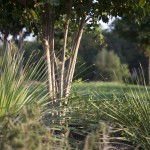Reax Roundup: Little Lizard Causes Big Stir
The U.S. Fish & Wildlife Service’s decision to not list the Dunes Sagebrush Lizard as an endangered or threatened species has everyone buzzing. Here’s a roundup of reactions from groups across the state.
Ken Kramer, the director of Sierra Club’s Lone Star Chapter was critical of the decision:

PHOTO COURTESY OF THE SIERRA CLUB, LONE STAR CHAPTER
Ken Kramer, Director of Sierra Club's Lone Star Chapter
“Let’s be clear that these agreements are voluntary,” Kramer said in a statement. “That means that the U.S. Fish & Wildlife Service will have to be active in seeing that these agreements are carried out and have the desired results, but the agency will not have the power to enforce the agreements. That’s the real difference between listing or not listing a species as endangered – not the specific actions to protect a species, which may well be the same in a voluntary agreement or an agency mandate, but the ability to make sure those actions take place. Basing the fate of the dunes sagebrush lizard solely on voluntary actions puts the species at greater risk.”
But not everyone found fault with the decision. Texas Land Commissioner Jerry Patterson weighed in on the issue, too, lauding the defeat of “federal reptile dysfunction:”
“Texans stood up and were heard,” Patterson said in a press release. “The drive to list this lizard wasn’t based on science, but was in response to abusive lawsuits filed against the federal government by a radical environmental group – and Texans showed that we don’t get intimidated so easily.”
Public Lands Campaigns Director Taylor Mckinnon of the Center for Biological Diversity voiced concerns similar to the Sierra Club.

PHOTO COURTESY OF THE CENTER FOR BIOLOGICAL DIVERSITY
Taylor Mckinnon, Public Lands Campaigns Director of the Center for Biological Diversity
“Today’s decision was based on politics and not science. The science is clear that the Dunes Sagebrush Lizard warrants protection to prevent its extinction. But in this case the Obama Administration caved to the oil and gas industry and has opted instead for voluntary conservation agreements that we think provide no assurance of protection or recovery for the lizard.
Vice President of Environmental Defense Fund‘s Land, Water, and Wildlife program, David Festa also applauded the decision in a press release.

PHOTO COURTESY OF ENVIRONMENTAL DEFENSE FUND
David Festa, VP of Land, Water and Wildlife Program at Environmental Defense Fund
“The Fish and Wildlife Service announcement is proof that working with landowners can pay big dividends for wildlife and keep species off the endangered list. Over half of America’s endangered wildlife depends on privately owned or managed land for their viability. That is why farmers, ranchers and landowners are essential allies in the effort to ensure that as our nation grows, we still have abundant wildlife populations to enjoy. Give them the tools and incentives – like candidate conservation agreements – and they will provide well-managed habitat at the scales needed today. The pro-active approach embraced here by industry, landowners and the Fish and Wildlife Service is an important component in meeting the needs of our nation in a way that benefits wildlife, is cost effective and respects landowners.”
And the frenzy over the little lizard didn’t stop there. Executive Vice President, Tom Amontree of America’s Natural Gas Alliance (ANGA)approved the decision.
“We welcome today’s decision by the Fish and Wildlife Service on the protection status of the dunes sagebrush lizard. The Interior Department’s decision offers further affirmation that natural gas production and environmental stewardship can and do go hand in hand,” said Amontree in a press release. “ANGA member companies are committed to the safe and responsible development of our nation’s abundant supplies of natural gas, and its production is critical to American energy security, jobs, the economy, and protection of the environment. This decision clearly recognizes the natural gas community’s work and commitment to conservation groups, regulators and communities to ensure a balanced path forward that advances both economic and environmental interests.”
In the conference call with reporters this morning, Interior Secretary Ken Salazar was asked to respond to comments from environmental groups that the Department’s decision was influenced by big oil companies. “I think it’s unfortunate that we’ll hear that comment from some groups. They may just want to keep the conflict going for conflict’s sake,” Salazar said.
The Texas and Southwestern Cattle Raisers Association (TSCRA) also stood in favor of the decision to leave the lizard off the list.
“This announcement is good news for Texas landowners,” said TSCRA president Joe Parker Jr. in a press release. “It is an excellent example of how stakeholders can voluntarily work together without the need for more federal regulation.”




